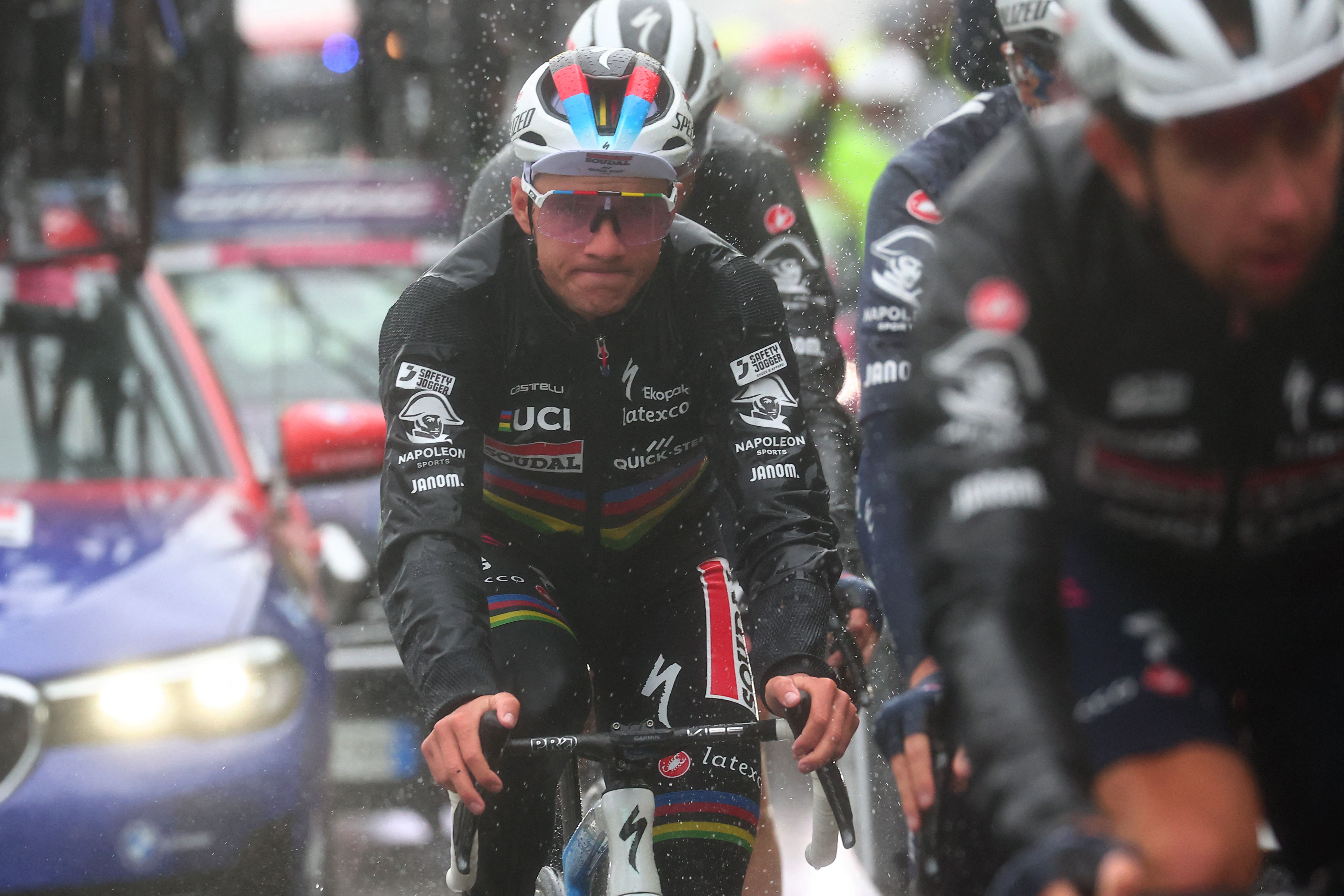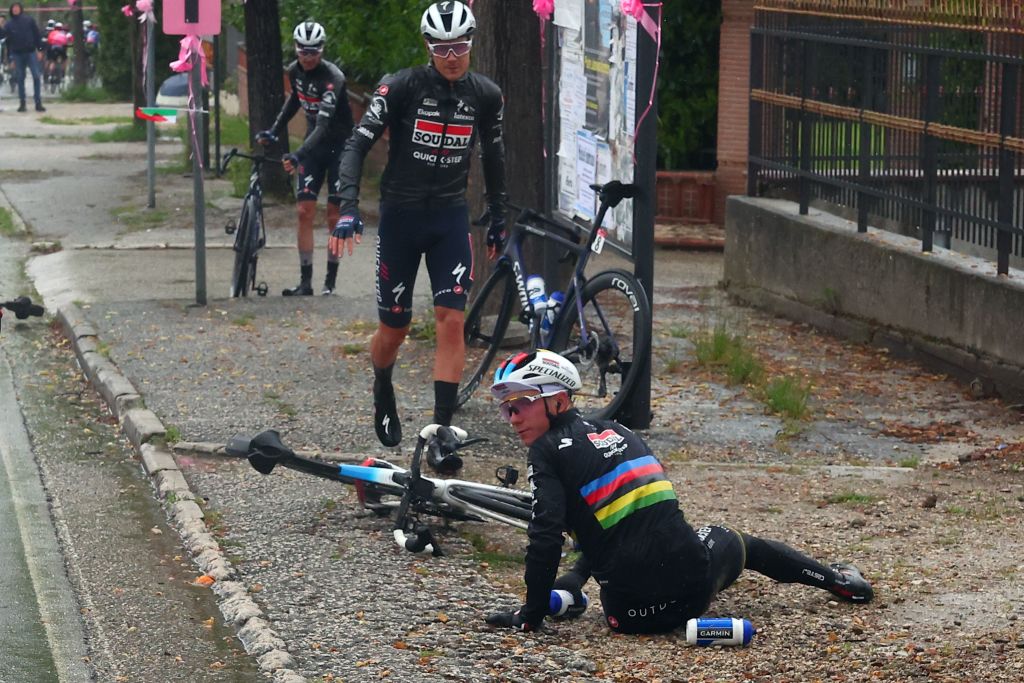Eyewitness: Remco Evenepoel's dog day afternoon at the Giro d'Italia
'Two crashes is a lot in three weeks. Two in one day is already too many'

In the press room in city hall in Salerno on Wednesday afternoon, a table of Belgian journalists sat watching footage of Remco Evenepoel's first crash on stage 5 of the Giro d'Italia with the kind of rapt attention the Warren Commission gave to the Zapruder film.
Again and again, they watched the images of the errant dog sallying obliviously into the peloton and bringing down Evenepoel's teammate Davide Ballerini, with the world champion falling moments later. Back and to the left.
For much of a sodden afternoon, that canine encounter looked set to be the story of the day, given that the peloton had effectively called a truce once Evenepoel had remounted and latched back on. For the bones of 100km beneath driving rain, the bunch would chase the day's early escapees at a sensibly measured pace.
Down at the finish on Salerno's seafront, television reporters were already instructing their camera operators to track Evenepoel's every move on crossing the line when their attention was hurriedly called to events still unfolding out on the road. Their voiceovers would need some rewriting.
With 7km remaining, a mass crash saw maglia rosa Andreas Leknessund (DSM) and Primož Roglič (Jumbo-Visma) among those involved, with both men forced into the frantic pursuit of the small leading group that was being led by Evenepoel's Soudal-QuickStep guard. For a few dizzying kilometres before the race was stitched unevenly back together, it even looked as though Evenepoel might retake the pink jersey.
Once the front group passed safely through the 3km to go banner, it seemed as though the day's drama had abated, but the Giro hadn't stopped Giro-ing. It never does. Moments later, Evenepoel was sprawled on the tarmac after a crash involving half a dozen or so riders.
The extent of his injuries was unclear, but his rage was evident when he stood gingerly to his feet and began exasperatedly calling for a replacement bike. A fresh steed was eventually procured, and Evenepoel began soft-pedalling towards the finish.
Get The Leadout Newsletter
The latest race content, interviews, features, reviews and expert buying guides, direct to your inbox!
By then, the reporters had spilled out into the road past the line, waiting for Evenepoel's arrival. Many of them didn't even see the bunch sprint that saw Mark Cavendish fall in the finishing straight after tangling with Alberto Dainese, who was later disqualified. Kaden Groves' eventual stage victory was already doomed to be relegated to a mere detail.
The Giro gruppo drifted through the finish area in ones and twos, while reporters scanned the haunted faces. It was a day of a hundred stories, but, as ever, there was space only for a few. A television crew drew close to Roglič as he stopped to get directions to his bus from a Jumbo-Visma directeur sportif. He smiled as he talked them through his stressful finale, laughing at his own fortune to emerge relatively unscathed. "I'm happy to be here, eh," Roglič said.
A little further on, Cavendish stood in the middle of the road, his face bathed in a mixture of rain and tears as he was consoled by Astana soigneur Michele Pallini and doctor Emilio Magni. It was hard to tell if the overflow of emotion was due to the injuries sustained or the opportunity missed. In the moment, it felt almost crass to ask.
A small group of Evenepoel's Soudal-QuickStep teammates gathered to keep vigil 50 metres beyond the line as they waited for him to finish. The world champion, however, wouldn't make it as far as their sentry post. He swung left immediately on crossing the line, rolling back along the seafront towards his team bus, parked 600m away on Via Carrella. As he glided away, a loose platoon of television cameras and microphones jogged hurriedly after him.
Vigil

The atmosphere was muted outside the Soudal-QuickStep team bus. In the aftermath of a typical stage, directeur sportif Davide Bramati can usually be found pacing outside the bus, providing the ambient noise by jabbering excitedly into a telephone, occasionally breaking off the conversation to offer instructions to supporting staff.
This time, and despite the entreaties of an increasingly agitated RAI television crew, 'Brama' was cloistered aboard the bus with the rest of the staff. Indeed, for a time, it appeared as though Soudal-QuickStep had called for an outright press blackout.
When Mattia Cattaneo emerged from the bus and climbed into a team car waiting to drive him ahead to the hotel in Caserta, he told a reporter that he wasn't allowed to talk until his Soudal-QuickStep team had decided what he was actually allowed to say.
In the meantime, a delegation from Trek-Segafredo had arrived at the bus and nudged its way through the crowd. Alex Kirsch had come down in the same crash at Evenepoel. Now, in the company of press officer Paolo Barbieri, he visited the Soudal-QuickStep bus to discuss the incident with the world champion and check on his condition.
"It was hardly Kirsch's dog who brought him down, was it?" one wag wondered. Almost in desperation, the man from RAI asked Barbieri to speak to camera, but he politely declined. What could he add? Shortly afterwards, Kirsch emerged from the bus and left without making a comment either.
All the while, the crowd around the Soudal-QuickStep bus was amplifying, but still no white smoke had emerged from the conclave on board. After a time, press officer Phil Lowe approached the scrum and made a short statement before retreating. There was, however, a problem. Nobody had heard it properly, but the word "broken" was definitely uttered. A garbled version travelled by induction through the crowd.
Cue excited murmurs before somebody thought to call Lowe back for clarification. "Phil! Phil!" He returned and raised his voice a few decibels, and a 'blessed are the cheesemakers' misunderstanding was mercifully avoided.
"It doesn't look like anything is broken for now," Lowe said. "We'll check him this evening and we'll make a statement this evening. For now, there's nothing else to say."
That message didn't appear to travel to Davide Ballerini, who stopped briefly to provide a comment when he made his way to a team car soon afterwards. The Italian was an unwilling protagonist in Evenepoel's initial crash, and that was the one still occupying his mind now.
"It's not the first time a dog has run loose in the peloton. I think it's a problem that needs to be resolved," Ballerini said darkly. As he spoke, it was hard not to conjure up the image of good boys up and down the Italian peninsula being rounded up and shipped off to Wes Anderson's Isle of Dogs for the duration of the Giro.
"Above all, I was worried that it was my fault when Remco fell," Ballerini continued. "I hit the dog and I fell. I slid a long way and Remco fell on the other side of the road. I think it was a domino effect."
Luck
Eventually, Bramati and his fellow directeur sportif Klaas Lodewyck emerged from the bus to talk to the reporters, even if they were unable to provide much more of an update on the situation.
"What happened?" the RAI man asked Bramati.
"Eh, I think everyone saw what happened, at the start of the stage already and then again with the other fall at the end," said Bramati, who added that the question of Evenepoel's continued participation in the race was one for the medical staff.
"It's the doctor who will decide. Remco's on the bus with the doctor, and the doctor will say later. But we're all calm. It's a pity, because two crashes is a lot in three weeks, so to have two in one day is already too many.
"The first one… we were a long way from the finish, the gruppo was calm and we were able to get back on steadily. In the finale, having a crash like that 3k from the finish is never nice for anyone."
As Bramati finished speaking, a group of local teenagers began shouting to get his attention. "Davide! Davide!" One of them held out a red 'cornicello.' The small, horn-shaped good luck charm is visible everywhere in these parts, but perhaps the superstition hadn't travelled north to Bramati's native Vaprio d'Adda. He looked uneasily at the item as it was pressed into his palm. "It's for Remco, for good luck," one of the group explained, and Bramati's face creased slowly into a smile.
Salerno and its hinterland haven't brought much luck to charismatic stars on the Giro over the years. Back in 1997, a cat ran into Marco Pantani's path on the nearby Valico di Chiunzi – which features on Thursday, incidentally – and his race ended that evening in Cava de' Tirreni, 10km or so inland from here.
It still wasn't entirely clear if history would repeat itself when Evenepoel eventually emerged from the Soudal-QuickStep bus an hour after the stage. His hood pulled up, he walked slowly towards a waiting team van while the knot of television cameras tightened around him. As Evenepoel sat into the passenger seat, he limited himself to one comment: "I'm in a lot of pain, we'll see."
Later in the evening, Soudal-QuickStep doctor Toon Cruyt provided a further update via a video message in which he explained that Evenepoel's injuries all stemmed from his second crash. The Belgian will start in Naples on Thursday, but that doesn't mean his hardship is over.
"Remco has a lot of pain on his right side and a hematoma with contraction of his muscles and some problems with his sacrum bone," Cruyt said. "Hopefully, with some good massage and osteopathic treatment followed by a good night's rest, things will go better. We will know more Thursday morning, but what's sure is that stage six will be a difficult one for him."
The Giro, as if Evenepoel didn't know it already, is a race like no other.

Barry Ryan was Head of Features at Cyclingnews. He has covered professional cycling since 2010, reporting from the Tour de France, Giro d’Italia and events from Argentina to Japan. His writing has appeared in The Independent, Procycling and Cycling Plus. He is the author of The Ascent: Sean Kelly, Stephen Roche and the Rise of Irish Cycling’s Golden Generation, published by Gill Books.